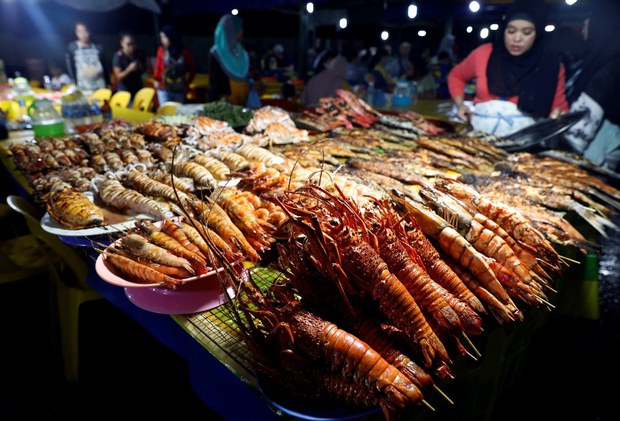Malaysia to Use Special ID to Control Movement of Foreigners in Sabah
2020.01.13
Kuala Lumpur and Kota Kinabalu, Malaysia
 A Filipina sells seafood in Kota Kinabalu, the capital of eastern Malaysia’s Sabah state, July 4, 2018.
A Filipina sells seafood in Kota Kinabalu, the capital of eastern Malaysia’s Sabah state, July 4, 2018.
Malaysia will introduce an immigrant pass in June to help authorities track foreigners in Sabah, officials said, a move that could make it harder for militants to slip in and out from the nearby southern Philippines, according to an analyst.
The proposed Sabah Temporary Pass, to be known by its Malay acronym PSS, will help standardize the various documents held by foreigners in the eastern state and facilitate law-enforcement operations, Malaysian Home Affairs Minister Muhyiddin Yassin said.
“The PSS is a control mechanism which will provide whereabouts and movement information of foreigners in Sabah,” Muhyiddin told reporters over the weekend.
Sabah, in Malaysian Borneo, has a population of 3.9 million, including about 1.1 million who are not Malaysian citizens, according to official statistics.
In September, the state’s Foreigner Management Committee agreed to issue the new identification card to replace the three documents currently issued to foreigners living in Sabah.
Filipino refugees, who had escaped to Sabah after bloody clashes between government forces and Muslim secessionist rebels in the southern Philippines in the early 1970s, carry a visitors’ pass known as IMM13, which was issued by the Malaysian immigration department.
IMM13 holders are allowed to stay in the state and receive other benefits, including medical services and access to education. To ease bank transactions, foreigners living in Sabah also often identify themselves using a document issued by the state’s chief minister, or a census certificate.
Muhyiddin, who spoke during a public event in Papar town in Sabah, said the PSS card would contain security features, including the holder’s biometrics. It can be obtained after payment of 120 ringgit (U.S. $29) in fees and must be renewed every three years, officials said.
More than 136,000 people living in Sabah would be eligible for the PSS card, Muhyiddin said.
“With such information and orderly records, any long-term action can be implemented more strategically,” the state-run news agency Bernama quoted him as saying.
The PSS card does not confer permanent residency to the foreigners and would not provide a guaranteed path toward Malaysian citizenship, the Home Ministry said in a statement.
Analyst: PSS would help track down foreigners with terror links
Wan Shawaluddin Wan Hassan, a professor and migration expert at the University Malaysia-Sabah, said the card’s security features would enable authorities to determine if the holder had any terror links.
“The security feature can be used to detect Abu Sayyaf group members,” he told BenarNews, referring to the Islamic State-linked group based in and around the Jolo and Basilan islands in the southwestern part of the Philippines.
In May 2017, Abu Sayyaf leader Isnilon Hapilon led pro-IS fighters from the Philippines and other countries in a siege of the southern Philippine city of Marawi. The militant takeover precipitated a five-month battle with government forces that left the city in ruins and 1,200 people dead, most of them militants.
The proposal to issue a new ID card received mixed reactions from Sabah residents, with many calling for the immediate deportation of foreigners living in the state.
“The government should deport IMM13 holders to their country of origin,” resident Sylvia Rosli told BenarNews. “That document was issued during the war [in the southern Philippines].”
She said the same policy should be adopted for foreigners who hold other forms of identification.
“Once all is settled, then only think of issuing a pass for them,” she said.
Shuyang Ana in Kota Kinabalu contributed to this report.







